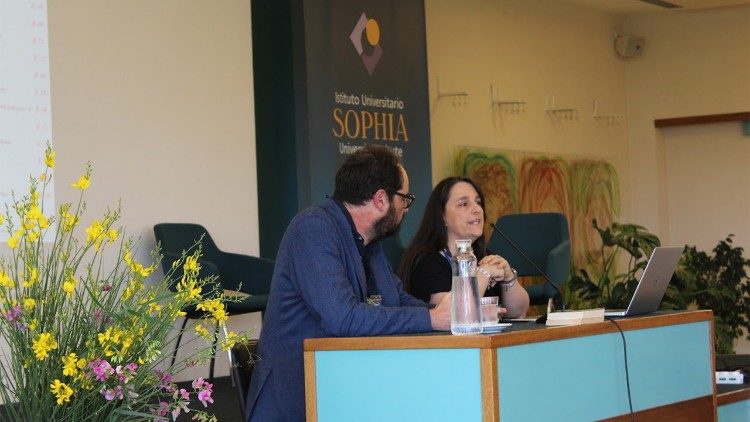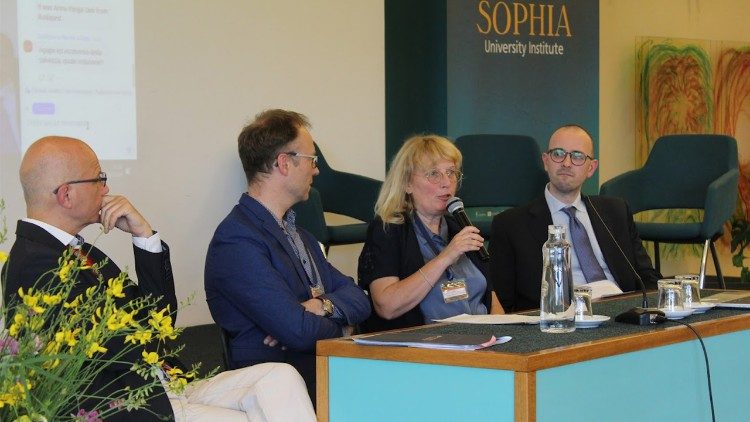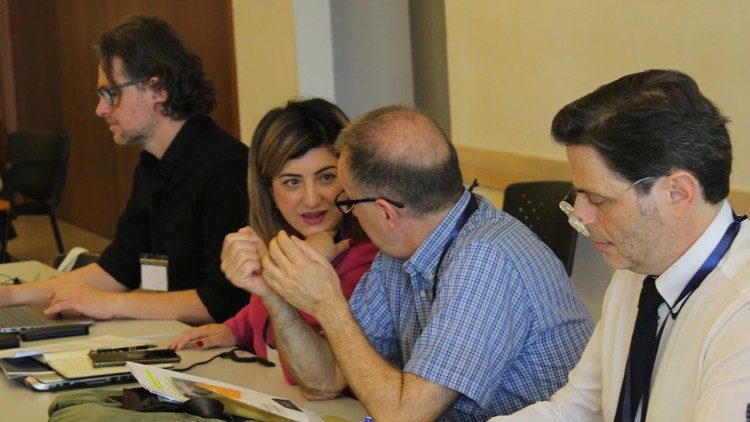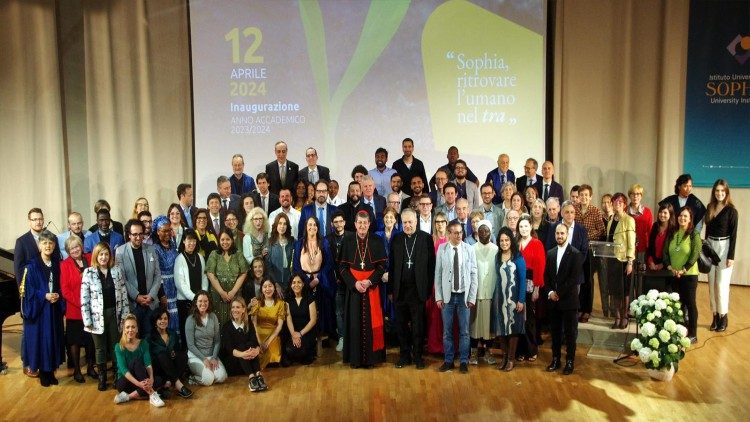The conference on the topic “The agape movement: key to sociocultural renewal” was concluded in Loppiano (Italy), whose objective was to scientifically investigate the transformative power of love, particularly that which is at the heart of Christianity.
Adriana Masotti – Vatican City
Collecting the legacy of the thought of the German theologian and philosopher Klaus Hemmerle, who died in 1994, who along his path had encountered the charismatic experience of Chiara Lubich, founder of the Focolare Movement, the Sophia University Institute took the common thread for the title and the content of the conference “The Agape Movement: key to sociocultural renewal”, held in Loppiano, headquarters of the Institute, from June 6 to 8.
«Looking at Hemmerle – explained the vice-rector Valentina Gaudiano, professor of philosophical anthropology, in an interview with the Vatican media – I am reminded of a very small book that he wrote in the seventies, ‘Thesis on Trinitarian Ontology’, in the that argues the need to return to the heart of Christianity. And the heart of Christianity is love, it is agape.
For Hemmerle, agape is the most radical thing there can be and at one point in the text he writes, remembering Saint Paul, that what remains is love. “And so, we have tried to understand to what extent this also has to do with current events.”
Refocus the value of love
Current events were, in fact, the second reason for the congress, also conceived from the confirmation of a reality in which hatred, resentment and personal interest seem to prevail. «We find ourselves in societies – Gaudiano stated – that have almost completely lost the deep sense of love and have fallen into indifference, something that even Pope Francis never stops reminding us. So thinking about love today, talking about it, means realizing that we find ourselves in contexts in which its opposite, heartbreak, almost prevails. “So we have decided to try to make it an object of reflection and research and see if we can refocus on the value of love as something that touches our existence and that, as such, can once again give meaning to our societies.”
The transformative power of agape
Aimed to be a scientific investigation into the transformative power of the complex phenomenon that is love, the conference reflected on agape from various perspectives, including social and cultural ones. “Love is what drives our existence – Sophia’s vice-rector tells us – but it is not just a private matter, as perhaps we have become accustomed to thinking or believing in recent decades.”
«It is not something intimate, referring only to our personal, family or friendship relationships. Love, and specifically agape, is something that has a transformative power because it invades all spheres of our life and does so in a social way, since it drives us to look even at strangers, at strangers, as possible objects of love. love itself and this has repercussions in the social sphere.
A revolutionary effect in concentric circles
«How can we not think about the current agape in the face of wars, violence, indifference to the discomfort and problems of others? –Gaudiano added – which highlights the way of acting of love: In agape the center is never in me, in the self, but rather it is outside of me, love displaces us outside of ourselves in the relationship with the other, but it is in this apparently unbalanced condition that it fully rebalances us. Loving is often a risk, but it is love itself that balances us since we need others to become ourselves.
«Whoever loves without necessarily expecting something in return experiences gratuitousness, thus opening the hearts of others to do the same. In the face of growing dehumanization, love lived and recognized in its revolutionary scope would have broad effects for an action, I would say, in concentric circles.
Interdisciplinary workshops according to seven perspectives
The congress was not only intended to be a moment of theoretical reflection. The presentations of the academic session were followed by seven interdisciplinary workshops through which participants were able to deepen their knowledge and skills in the relational and participatory field, such as listening skills, the ability to work as a team, adaptability and development. of creativity.
Some examples: the workshop dedicated to politics aimed to propose the option of dialogue – listening, sharing, guiding – not only as a means of convergence in the current polarized context, but as an authentic expression of the social character of humanity in the construction of coexistence. . In particular, the role of words, communication and mediation was questioned.
Or, in the sociology workshop, the debate centered on the question of whether love could be a dimension of human well-being that could be “measured” in some way. Together with the participants, an attempt was made to construct an appropriate index for this purpose. Or also in the pedagogical workshop, inner attention exercises were proposed with the aim of developing an attitude of community care through one’s own work.
From the level of micro-realities to relationships between peoples
«The workshop part – Valentina Gaudiano stressed – was introduced so that the beautiful discourses heard would take root in the participants through a personal appropriation that would allow each one to take home this dimension of agape love in their daily lives.»
But is agape practicable in the different spheres of life, of society, of people?
«There are people in all latitudes – responds the vice-rector – who spontaneously experience love. Starting from this observation, we believe we can affirm that agape is practicable in the life of societies first of all at a micro level, that is, it is useless to think about higher systems. Agape-love is feasible if we look at the relationships of those micro-realities that later constitute the towns, and therefore not only in the first instance the families, but all educational environments, schools, associations, parishes and neighborhoods”.
«If in these tissues, which are the most immediate for each of us – Gaudiano added – this message passes and the consideration of the conquering value of agape increases, then by concentric circles this reality invades a population and then we can hypothesize that love can also touch international relations and, therefore, relations between peoples.
Knowledge through the heart
During the same days of the congress, a pictorial exhibition was set up in Loppiano to highlight the existence of a dimension other than the intellectual and scientific one to know reality and move in it, a dimension that is often underestimated, especially in the West: the knowledge of the heart.
Gaudiano stressed in this regard that “the dimension of the heart has its own and specific cognitive sphere that must be intertwined with the purely rational” and that “the cultivation of values, such as aesthetic ones, highlighted with this exhibition and during the conference through of presentations that talk about aesthetics and develop this emotional and spiritual dimension of beauty, is a source of growth for our humanity and becomes a way to acquire a more complete knowledge of reality in its complexity and multiform character.
Study and life, two deeply intertwined aspects
The reflection in Loppiano will probably be destined to continue. «We are only at the beginning – said the vice-rector of the Sophia University Institute – in a way we have raised the curtain and several interesting avenues will open in this sense. This is in continuity with Sophia’s activity and mission, but I would not say – he specified – only in continuity with what was studied and explored here, because it is not that we study love every day, but in continuity with the style of life that we want to propose.
Here, at Loppiano, life and study tried to walk together because we are deeply convinced that what we learn from books or from teachers who have carried out a certain training and research work, can and should be reflected in daily life and vice versa. It is the very reality in which we were immersed daily here in Loppiano that spoke to us, challenged us and has every right to encourage our reflection and, therefore, to direct the study itself.
“A conference that, therefore, focuses on agape as a reflection and also as a proposal for existential application is precisely a clear expression of Sophia’s entire educational proposal, regardless of the specific courses of study one chooses to undertake here.”









